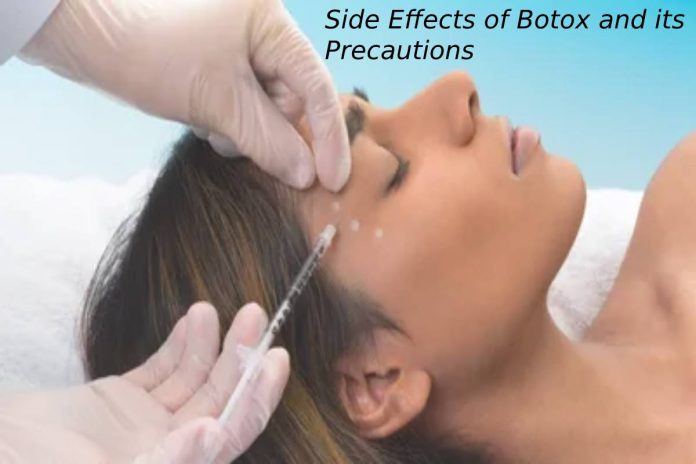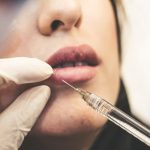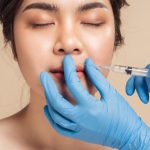Side Effects of Botox and its Precautions
In today’s article, we will develop the side effects of Botox, treatment with botulinum toxin type A for aesthetic purposes that has become very popular in recent years.
It is an effective treatment to treat dynamic or expression wrinkles on the face. It is particularly indicated in the upper third of the face to avoid creases in:
- Front
- Frown
- Crow’s feet
- Periocular area
It is also use for non-aesthetic purposes for treating hyperhidrosis or excessive sweating in the armpits, palms of the hands and feet, and correction of blepharospasm. It is a suitable treatment for both women and men.
Although many patients do not know it, Botox is not the only appropriate treatment for those who have marked wrinkles after many years with significant facial gestures. On the contrary, it is even more effective if used as a preventive treatment from an earlier age, approximately from 30-35 years of age, even if there are not many marked wrinkles yet.
Faced with the expectation of repeated treatments (usually twice a year) with the toxin, some patients wonder about the side effects of Botox, both in the short and long term and about the precautions they should take after the application of the toxin. If that is your case, keep reading because we will tell you about it in this post.
Also Read: Masks with Honey for the Face
Properties of Botox
The effect caused by Botox is the temporary paralysis of the muscles in which it infiltrates. The toxin blocks the neuromuscular junction, so nerve impulses cannot produce contraction and muscle movement. This causes the patient to have little gestures of the face, and therefore, less dynamic wrinkles are forming. The paralysis does not have to be complete to achieve a smooth movement without a mask effect or an expressionless face.
The effects of Botox are transitory, with the return to normal mobility in approximately six months, so it is entirely reversible.
Precautions after Botox
After a Botox infiltration session, no great precautions are necessary, and the return to entirely everyday daily life is almost immediate. However, it is good to follow the following recommendations:
Intense Exercise
Although daily life activities can be carry out immediately, it is recommended not to do intense or strenuous physical exercise, or vigorous sports, in the first 24 hours.
Local Massages
It is recommended not to massage the treated area after the session.
Analgesics
If you have pain after the treatment, you can take a pain reliever such as paracetamol or non-steroidal anti-inflammatory drugs.
Side Effects of Botox
In addition to the sideeffects, Botox can produce unwanted or adverse effects, like the vast majority of medications. These effects are generally rare, and depend on the area of infiltration . Most occur in the first hours or days after treatment, although some may appear long-term.
We are going to focus on the side effects in treating wrinkles on the face(on the forehead, between the eyebrows and on the crow’s feet).
Swelling and Bruising
Small bruises may occur at the puncture sites, which disappear spontaneously in 2-5 days. It is not advisable to massage them.
Eyelid Ptosis
One of the most known and feared side effects of Botox is ptosis or drooping of the eyelid . It occurs because the toxin that infiltrates the forehead or between the eyebrows diffuses to the upper eyelid and paralyzes the muscle that elevates it, causing it to fall. It can be treated with eye drops and is completely reversible.
Allergic Reactions
Like any medication, Botox can produce allergic-type reactions, which can be mild and produce only inflammation, redness and swelling , or more serious and present with symptoms such as shortness of breath and significant edema.
Asymmetry in the Face
If the toxin is not apply correctly and in the right doses on both sides of the face, asymmetries can occur , with unevenness in the height of the eyebrows, deformities and inharmonious movements.
Other Minor Effects
There are mild side effects such as redness and pain at the puncture points, headache or headache, and a flu-like picture.
The vast majority of these effects appear in the first 24-48 hours after infiltration. And the most common is that they are short-term effects. Which disappear in the first days, such as inflammation, bruising, headache, or flu-like symptoms. The ptosis or drooping of the eyelid maybe, but it still can last up to 2-3 weeks. Other effects, such as facial asymmetries , must be corrected with a “touch-up” (new additional toxin infiltration) or they will last up to 6 months for the toxin to lose its action.
It is important to know that the most serious adverse effects of Botox are in many cases due to inadequate infiltration , so that the toxin spreads to muscles where it should not act. Therefore, it is very important that treatment is carried out by a properly trained specialist doctor. Make sure you have this type of treatment in a licensed clinic with certified specialists.
Also Read: Can Probiotics Prevent or Treat Acne?


















